All you need to know about raising vegan kids! Meeting nutritional needs, finding kid-friendly vegan food, dealing with social situations and more.
No matter if you’re already on a plant-based diet or want to transition your whole family away from animal products, raising vegan kids can bring along a particular set of challenges.
Many people believe that it’s forceful or downright unhealthy to feed your child “nothing but plants” and you might get discouraged from trying to raise vegan kids altogether.
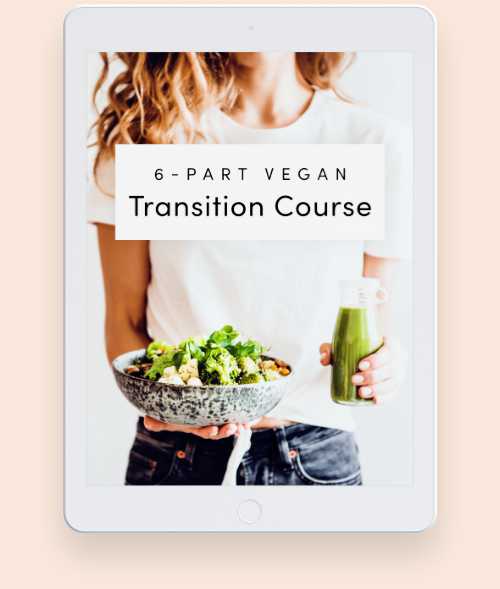
join our free vegan course!
Learn how to thrive on a plant-based diet with practical tips & a 3-day meal plan!
Are vegan kids stunted in growth? Can their bones and nervous system develop properly? And what if your children don’t eat vegetables at all?
Let’s look at these concerns and go over essential nutrients, the benefits of plant-based eating, delicious kid-friendly recipes, and real-life tips.
For more information on this subject, read our guide to being vegan when your family is not, living with a non-vegan family, being vegan in college, and transitioning to a vegan diet.
Is a plant-based diet safe for kids?
As stated by the Academy of Nutrition and Dietetics, the largest organization of nutrition professionals in the world, “well-planned vegetarian and vegan eating patterns can be healthful and appropriate for all stages of the life cycle, including infants and toddlers.”
Medical doctors from the American Academy of Pediatrics (AAP), agree:
”Eating a plant-based diet can be a beneficial choice for your family.”
This doesn’t mean, however, that any vegan diet will be healthy! By well-planned, nutrition experts mean that all nutrient requirements need to be met by offering the right foods and not shying away from important supplements.
If your family isn’t already used to a plant-based diet, you can think about going vegetarian first and then look into going dairy-free to make this process easier.
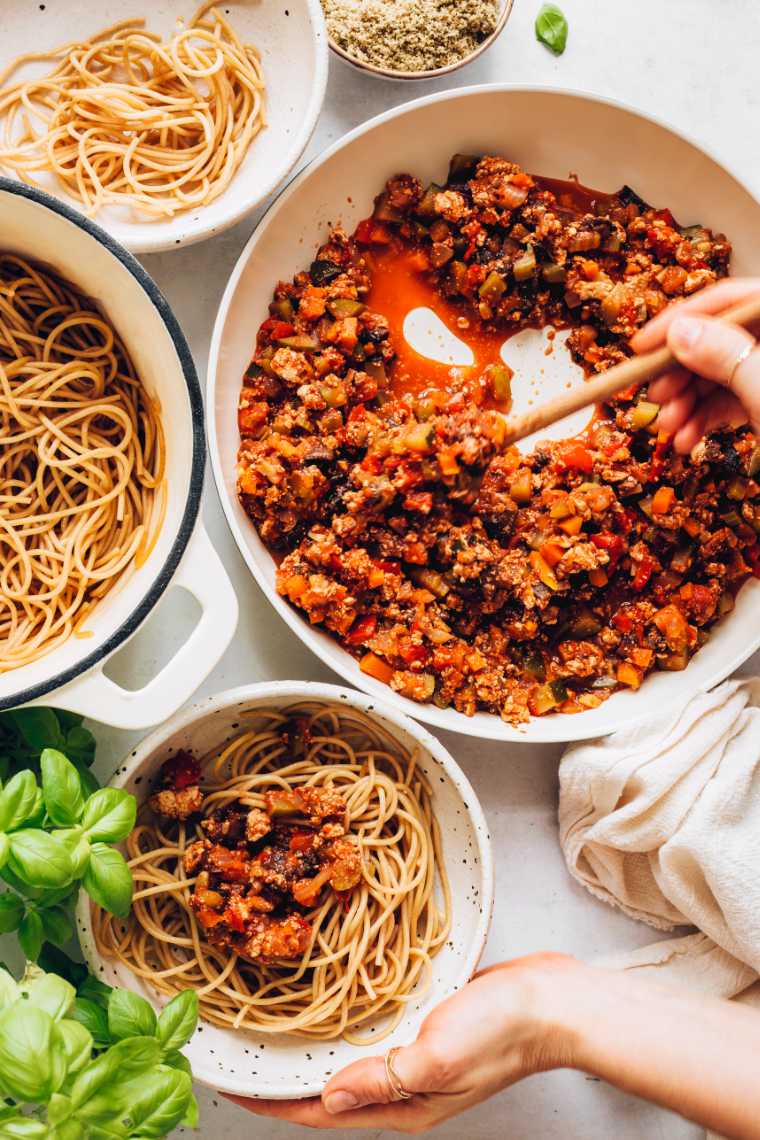
What does vegan mean?
A vegan is a person who does not eat any food derived from animals and does not use any other animal products. It is more than just a diet, more like a philosophy of trying to cause the least harm possible to other sentient beings.
Because veganism is a lifestyle and has to be understood in its underlying principles to be embraced, it is not possible for very young children to truly “be vegan”.
Rather, you could say that kids can follow a plant-based diet until they understand the vegan philosophy and stand behind its principles themselves.
However, we use the terms vegan and plant-based interchangeably on this website and encourage every person and family to get as close to veganism as possible.
Benefits of plant-based eating
- Showing kindness towards animals
- Having a lower environmental footprint
- Reducing the risk of heart disease, diabetes and high blood pressure
- Maintaining a healthy weight more easily
- Potentially saving money
Keep these positive things in mind when you think about transitioning your family over to a plant-based lifestyle — even though you might be faced with social situations that can be tough, it’s still so worth it.
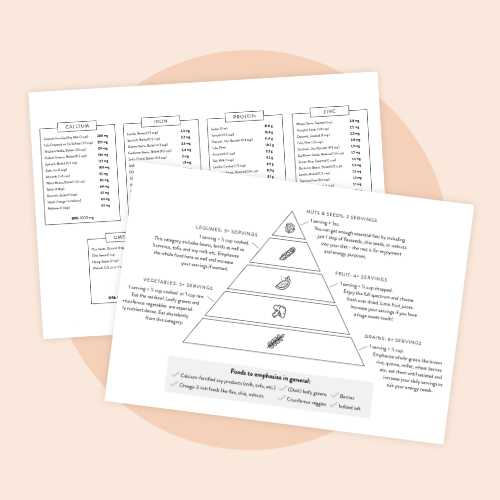
download our free vegan nutrition printables
Grab your free PDF and sign up for our newsletter by entering your email below!
Vegan kids nutrition tips
As stated at the beginning of this article, a fully plant-based or vegan diet can be healthy during all stages of life.
However, a plant-based diet needs to be well-planned and just like people eating animal products need to make sure they consume enough fiber and not too much saturated fat, vegans have their own set of potentially critical nutrients.
Let’s go over them and see how you can make sure your kid gets enough of them! For more detailed information, check out this wonderful resource by The Vegan Society for vegan nutrition tips through all stages of life.
Calories & Fiber
Some vegan foods or meals can be lower in calories compared to their animal-based counterparts. Since kids may have smaller appetites and bellies, be sure to include enough high-calorie vegan foods like nuts, beans, avocado or peanut butter sandwiches in their diet.
Use some refined grains, peel the skin from fruits and serve cooked instead of raw veggies to decrease the fiber in their meal so they can consume more food.
Daily calorie requirements change from year to year, check out this graphic to get a better idea of how much food your child needs!
Protein
Babies and older kids need plenty of protein for all of the growth they are going through! That doesn’t mean that meat, dairy and eggs are must-haves on your children’s plates.
Plant-based protein may not be as easily absorbed but it can be found in many delicious vegan foods!
Once your child is no longer breastfeeding or consuming infant formula, you can introduce solid forms of protein such as well-cooked mashed beans, tofu or fortified soy milk. Older kids can enjoy a larger range of protein-rich vegan foods!
From bean burgers or falafel wraps to seitan, nuts, seeds and whole grains, offering a variety of plant-based foods helps to meet the daily needs for all essential amino acids.
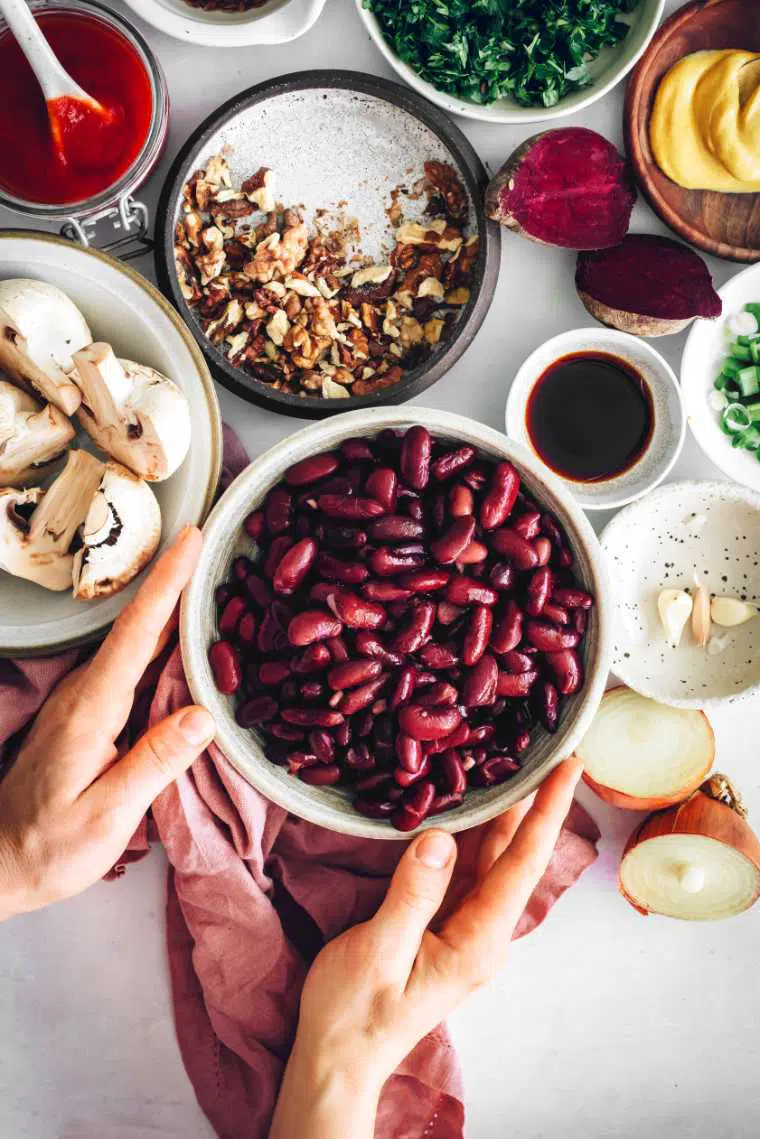
Vitamin B12
Everyone following a plant-based diet needs to supplement with vitamin B12! The same goes for vegan kids.
This nutrient is important for a healthy nervous system and blood cells, and quite a few vegan products are fortified with B12 nowadays. However, don’t rely on soy drinks or cereals alone and choose a supplement.
B12 on a Vegan Diet →Vitamin D
The American Academy of Pediatrics recommends all breastfed infants receive 400 IU per day of supplemental vitamin D starting shortly after birth.
This should continue until your child consumes the same amount of vitamin D from fortified milk at the age of 12 months and older!
Many vegans take additional vitamin D supplements to be safe, especially during the colder months when they cannot obtain this nutrient via sunshine.
Iron
Meat isn’t the only source of iron! Plant-based iron can be found in leafy green vegetables, beans and fortified cereals.
Pair these foods with a food that’s high in vitamin C (such as citrus fruit or bell pepper) for better absorption!
Unfortunately, mom’s breastmilk is low in iron which is why babies need an outside source of this nutrient after around 4-6 months of age. Choose mashed tofu or pureed beans as well as iron-fortified cereals in the beginning!
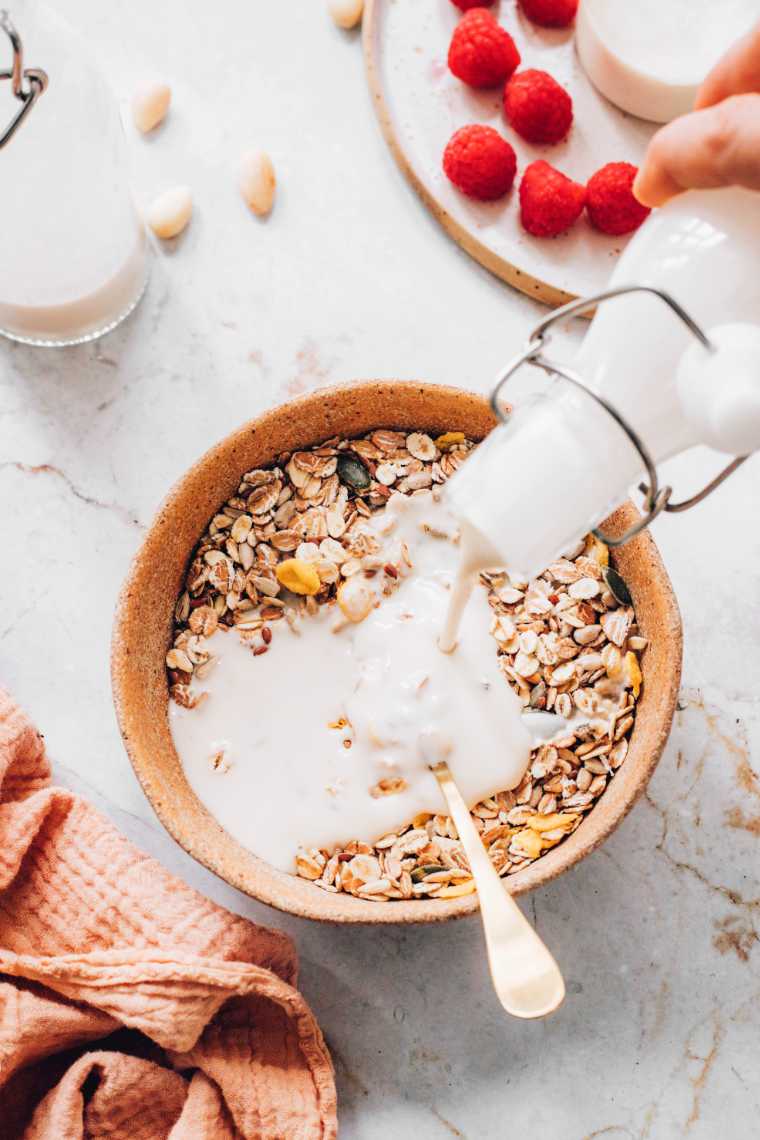
Calcium
One of the nutrients many parents worry about is calcium. How do you get enough without dairy products?
Luckily, many plant-based milk alternatives like soy or oat milk are calcium-fortified so they offer around the same amount per serving as cow’s milk.
Other calcium sources include tofu, collard greens, broccoli, pulses and sesame seeds.
Breastmilk and infant formula usually contain enough calcium for small children!
Omega 3
Many kids don’t like eating fish or seafood, so taking care of their omega-3 needs is important no matter if your family is plant-based or not.
It’s a good idea to supplement DHA during pregnancy for your child’s brain development and continuing to provide your children with this supplement once they are born is a good safety net.
It is possible for the human body to create DHA from the plant-based omega 3 fatty acid ALA, which is found in foods like flax seeds or chia seeds — however, the conversion rate may not be efficient.
You can easily add some DHA drops made from microalgae to your kid’s smoothies, soy milk or stir it into some vegan yogurt!
Zinc & Iodine
You might want to consider looking for good plant-based sources for these two minerals in addition to the other nutrients that have been listed.
Zinc can be found in fortified cereal, oatmeal, tofu, pumpkin seeds, lentils and green peas. To ensure proper levels of iodine in the diet, use iodized salt and add some sea veggies to your kid’s (and your own) diet if you can!
However, the latter may not be very reliable in terms of the iodine content and choosing a supplement that contains an adequate amount of iodine is preferable.
Complete Vegan Nutrition Guide →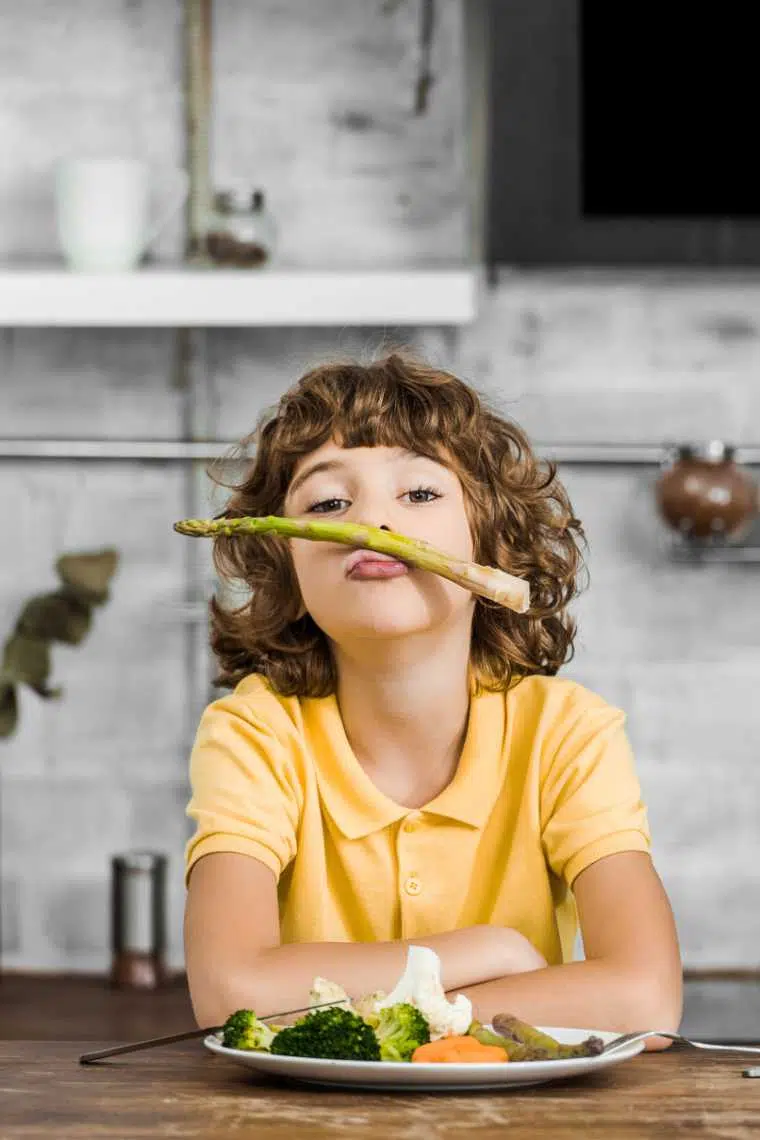
Tips for raising vegan kids
Here are our top tips for raising vegan kids when it comes to making plant-based food more appealing, dealing with tricky social situations and more.
Please keep in mind that we know that every child and every family is different, so take from these tips what works for you!
Involve health professionals
Before changing your child’s diet, it’s a good idea to discuss concerns and possible risks with your pediatrician or a pediatric dietitian.
Show that you’re educated about supplementation and critical nutrients, and ask for any symptoms to watch out for that may indicate your child’s nutritional needs are not being met.
Talk to your children
Explain why you want to swap out some foods at home. Depending on the age of your child, you can go more or less into detail and appeal to their inherent love for animals!
While it can be hard to find the right words for what is happening in animal agriculture, helping them make the connection between their food and living animals can already help. Find the best reasons to go vegan here.
Kids don’t want to be forced into anything, so take their concerns seriously and make this transition easy and fun!

Make their favorite food vegan
Nobody wants to have all of their favorite food taken away from them all of a sudden! So, instead of coming up with new and unfamiliar family dinners, think about how you can create vegan pizza or tacos.
Buy some shredded vegan cheese for pasta or casseroles, try vegan sausages or mock chicken that you can use instead of the animal-based versions! Embracing these vegan alternatives can really help.
However, be sure to add veggies to most meals (chopping them finely or pureeing them helps!) and try some new dishes from time to time.
Secretly Veggie-Stuffed Pizza Rolls →Let them help in the kitchen
Getting your kids more involved in all things food can start in the grocery store! Go search the aisles for new vegan foods you want to try or download our free vegan grocery list to get some new ideas for what to shop.
Next, start a vegan meal planning session with your children and have them request their favorite meals or look for new vegan recipes together and decide what you want to make!
When the time comes to prepare the actual food, ask them to chop veggies (with assistance if needed) or stir the sauce, let them help in any way you can think of. Your kids will be super proud of the meals they’ve helped create!
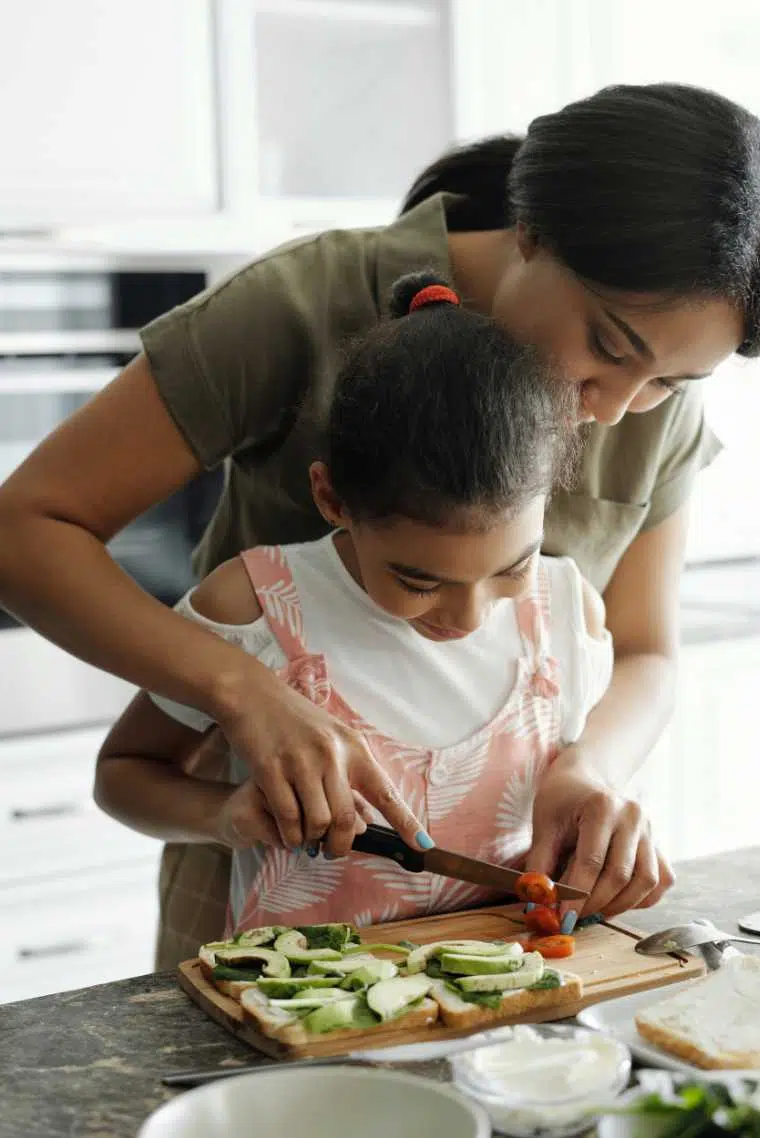
Ease into a plant-based diet
Add some vegetables to your tomato sauce, put frozen spinach into smoothies, use olive oil instead of butter for cooking and offer fruit for dessert!
Invite your kids to create colorful bean burgers together or decorate fun smoothie bowls with them. You can also let them choose meat and dairy alternatives at the store they want to try.
All of these tiny steps can help your kids and your whole family to enjoy more whole plant-based foods!
Offer lots of vegan snacks
There are so many kid-friendly vegan snacks on the market, many of which your little one may already enjoy.
From fresh fruit to veggies with hummus, rice crackers, pretzel thins, trail mix, apple sauce, energy bars or chips, kids need these calories and nutrients all day long!
Try some homemade vegan bliss balls or vegan smoothies to see if your children like them.
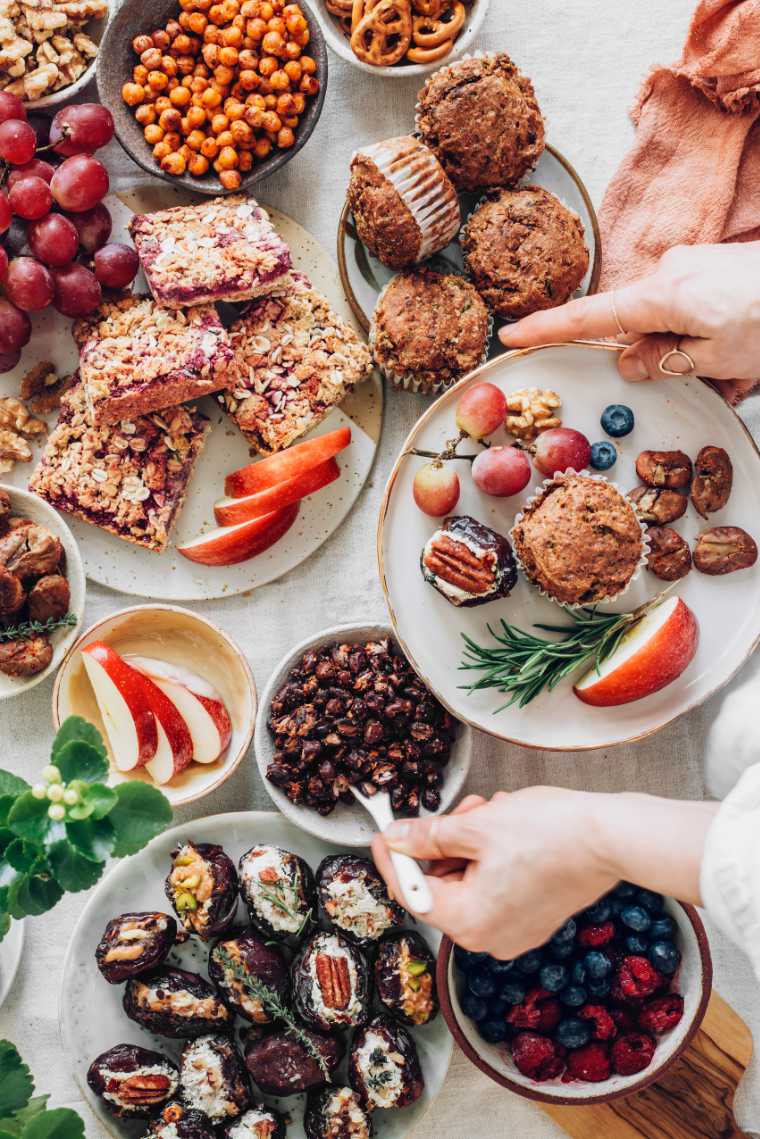
School & birthday parties
Social situations like getting together with friends or school lunches can always entail a few challenges. There is no right or wrong answer for how to deal with these moments and what to allow your child.
If your kid is serious about wanting to be vegan and doesn’t want to eat animal products even outside of home, talk to someone who is responsible at school for all things food and see if they can offer a vegan option.
Should that not be possible, you can send your child to school with a lunchbox every day! Find some portable vegan lunches here.
When it comes to play dates, talk to the other parents about your special dietary needs or send your kid over with some delicious food they can share with their friends! Birthday parties can work pretty much the same way.
Encourage your children to be confident and proud of their eating pattern and since more and more people eat diets that are higher in plant-based foods, the stigma around veganism won’t be around forever.
Mental health
If you notice signs that your children get nervous around eating time, you’ll want to talk with them about it!
Having a healthy relationship with food is fundamental for well-being all throughout life, and if they feel unhappy and pressured to not consume any animal products, allow them to do so.
They might also see the world and their friends with different eyes once they understand what happens to animals to end up as food.
If they see people around them consuming animal products, they might become upset or angry and you need to explain that it’s not easy for anyone to change their diet and just go vegan. Teach compassion as best as you can.
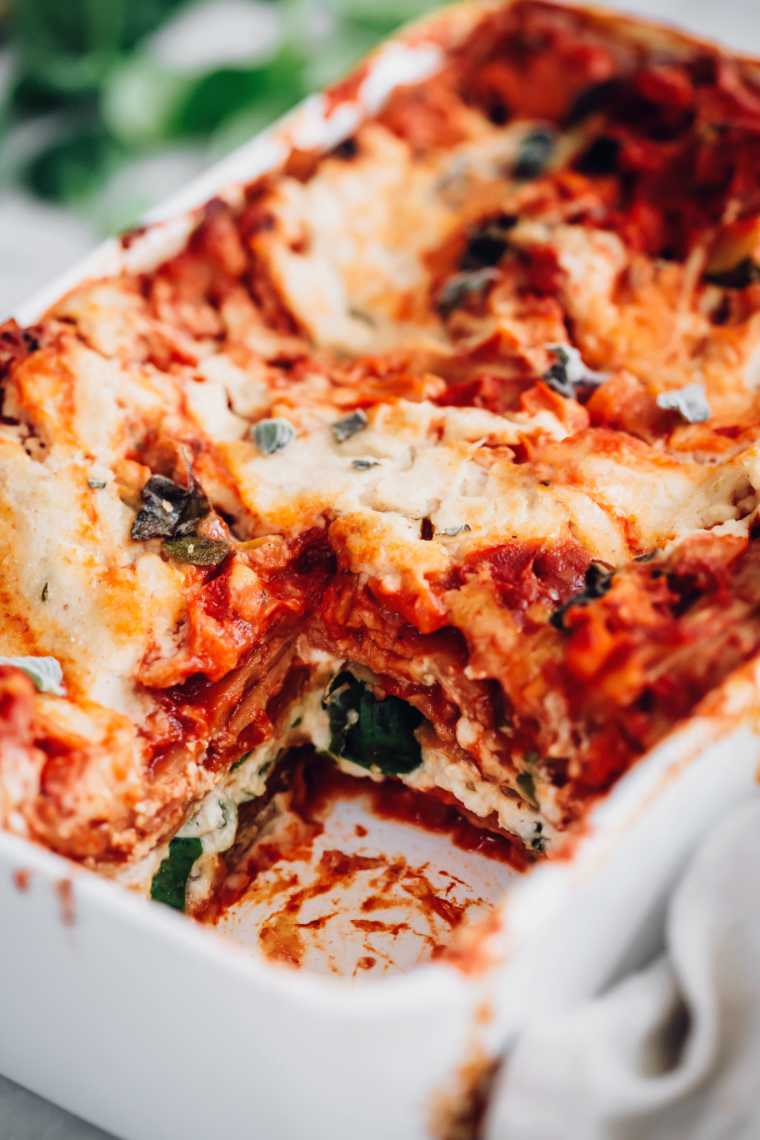
Kid-friendly vegan recipes
We recommend that you start by trying to make your kid’s favorite meals vegan and then offer new vegan options to make the transition easier!
Try to provide as much fresh fruit and veggies throughout the day or with meals as you can! Pair them with a delicious vegan dip for added nutritional value and to make them tastier.
Remember that it’s sometimes better to keep foods separate for your kids to enjoy them and don’t make the food too spicy.
Kid-friendly vegan breakfast
- Pancakes with fruit
- Blueberry muffins
- Strawberry smoothie
- Oatmeal with fruit & nuts
- Granola with dairy-free milk
- Raspberry banana bread with almond butter
- Peanut butter and banana sandwich
- Tofu scramble with vegan breakfast sausage
Kid-friendly lunch & dinner
- Vegan mac and cheese
- Pasta with white sauce
- Mini pizzas
- Vegan quesadillas
- Vegan meatballs
- Cauliflower nuggets
- Hummus wraps
- Creamy potato salad
- Bean burritos
- Vegan grilled cheese sandwich
- Falafel tacos
- Creamy lasagna
- Mashed potatoes and gravy
- Vegan pot pies
- Broccoli cheese soup
- Pasta marinara
- Bean burgers
- Vegan sloppy joes
- Orange tofu chicken
- Bean chili
- Vegan chicken noodle soup
Kid-friendly vegan snacks & treats
- Tortilla chips with salsa and mashed avocado
- Baked sweet potato fries with cashew sour cream
- Skillet cookie
- Veggie chips
- Mini pretzels
- Popcorn
- Applesauce
- Mango chocolate smoothie
- Raspberry jam oat bars
- Trail mix
- Breaded vegetable croquettes
- Energy balls
- Edible cookie dough
- Celery or apple with peanut butter
More vegan guides
For some further reading on all things vegan kids, we recommend this thorough article by Reed Mangels, PhD, RD.
Did you like our tips for raising vegan kids? Check out these helpful lifestyle guides next.
- 1-Week Vegan Meal Plan
- 25 Vegan Staple Foods
- Best Vegan Documentaries
- How to Start a Plant-Based Diet
- Being Vegan on a Budget
Are you interested in raising vegan kids? What challenges do you face and do you have any success stories to share? Let us know in the comments below and be sure to Pin this guide here or share it on social media.

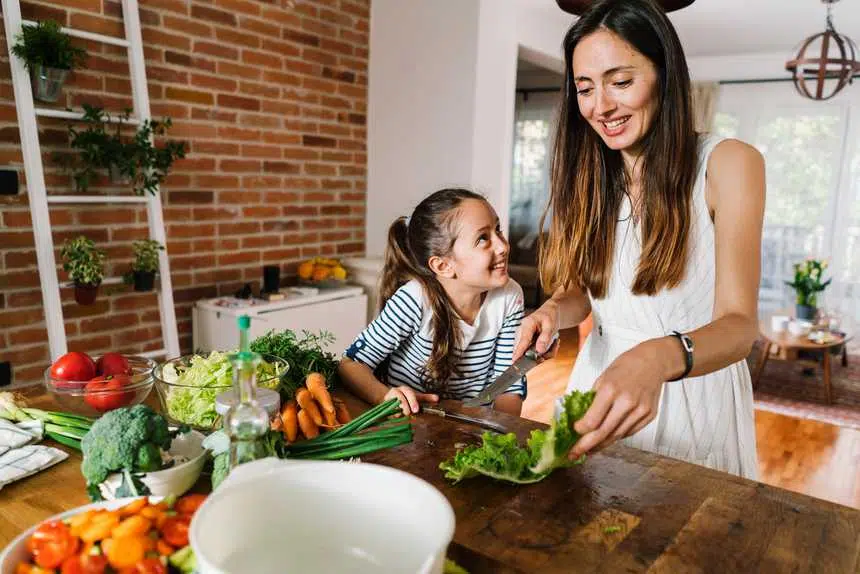
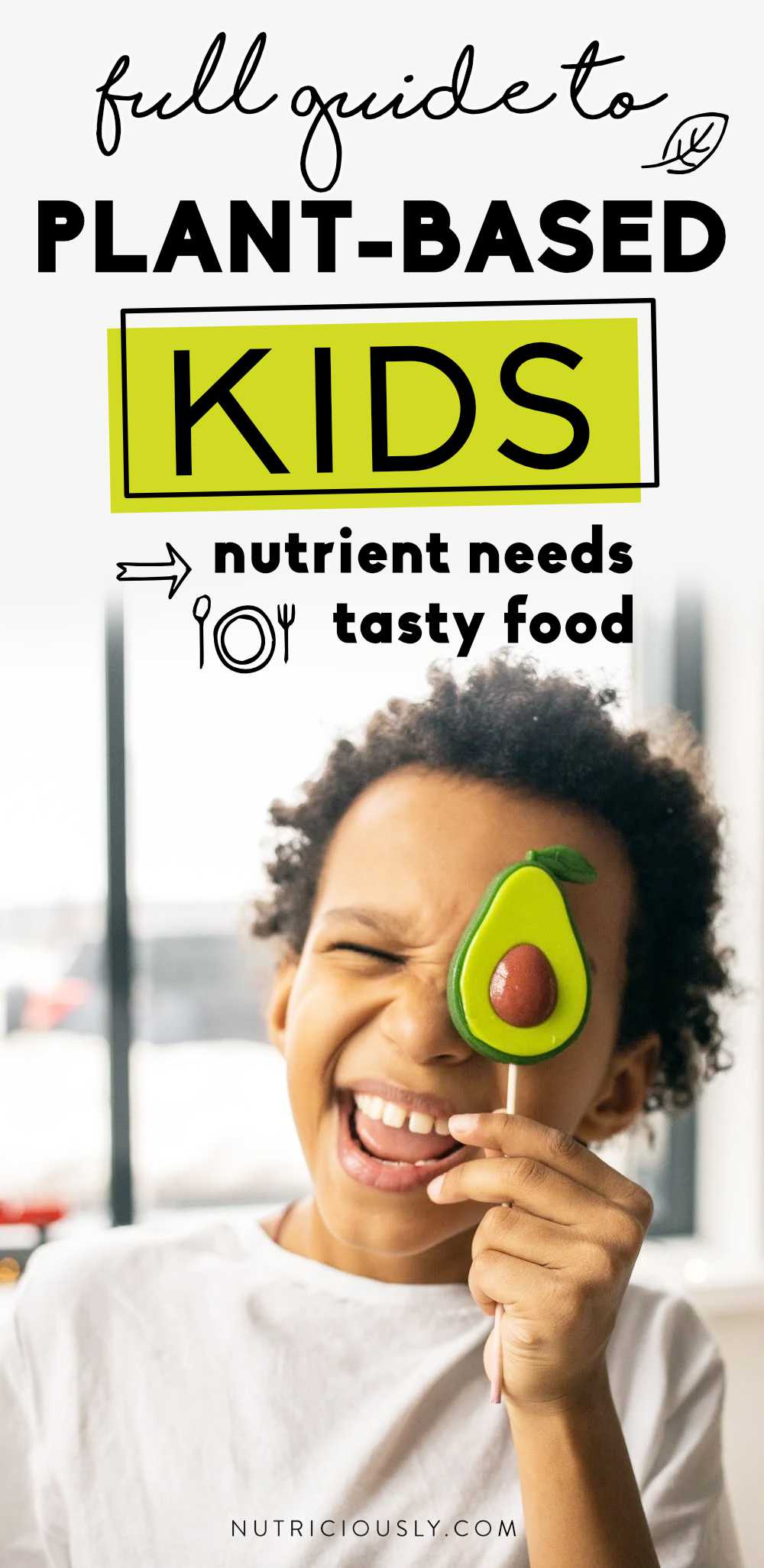
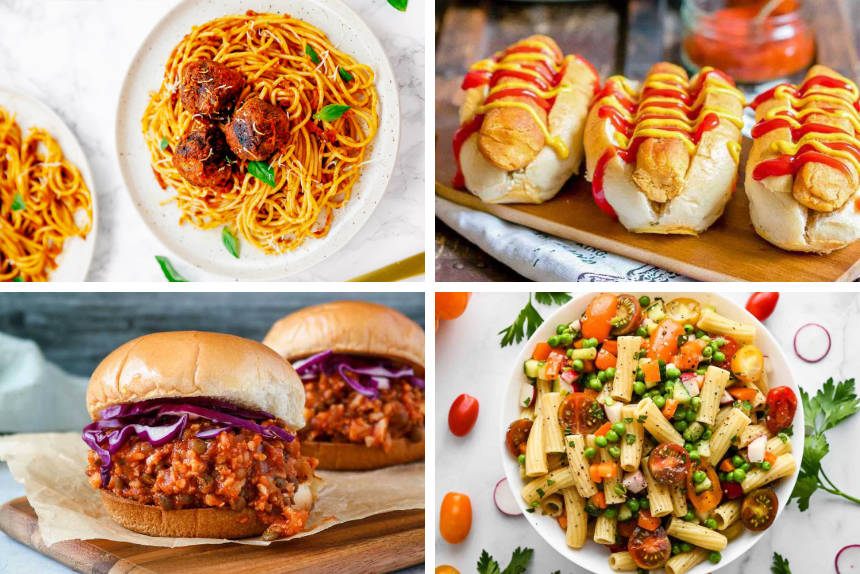
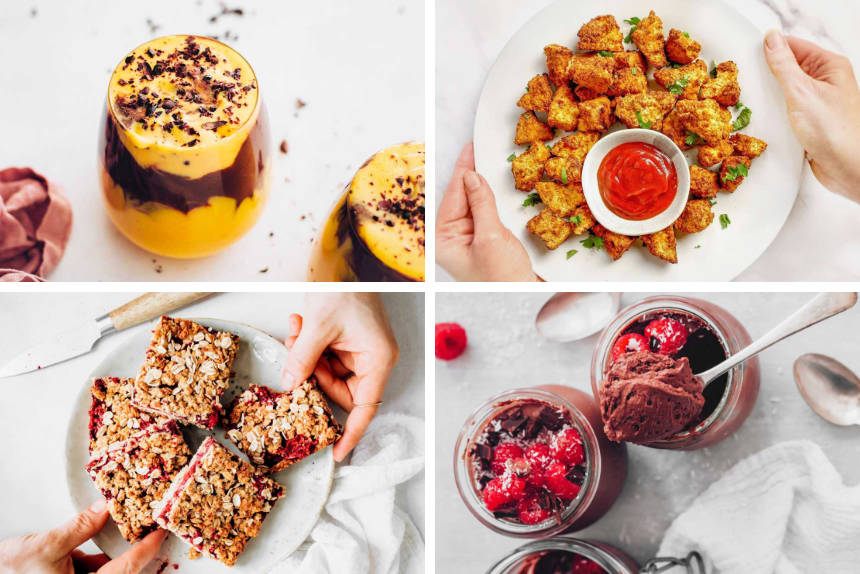
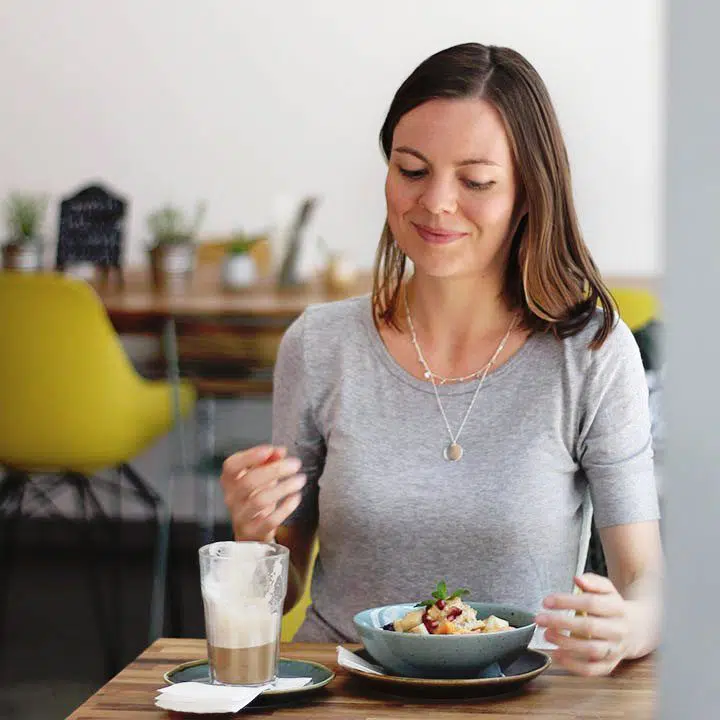
 Alena Schowalter is a Certified Vegan Nutritionist who has been a vegetarian since childhood and vegan since 2012. Together with her husband, she founded nutriciously in 2015 and has been guiding thousands of people through different transition stages towards a healthy plant-based diet. She’s received training in the fields of nutrition, music therapy and social work. Alena enjoys discussions around vegan ethics, walks through nature and creating new recipes.
Alena Schowalter is a Certified Vegan Nutritionist who has been a vegetarian since childhood and vegan since 2012. Together with her husband, she founded nutriciously in 2015 and has been guiding thousands of people through different transition stages towards a healthy plant-based diet. She’s received training in the fields of nutrition, music therapy and social work. Alena enjoys discussions around vegan ethics, walks through nature and creating new recipes.
An amazing article for children feeding and their childhood nourishment.
Ragards
Shivkant
Hi Shivkant, thanks for your comment. Glad you enjoyed the article. All the best, Lars
Love this! I am vegan and my husband is not (outside of the home). We’re trying to get pregnant soon and I know he will support me in raising our children vegan but I am worried about other people. There is NO ONE in our lives that is veg and everyone always has an excuse when I offer just a little bit of information…even after they ask, ha! Ridiculous but reading articles like this is comforting. Thank you!
Hi Jenna,
thanks so much for reaching out. I totally understand your struggle and fear of making a mistake when it comes to the health of your child. Check out this awesome video of a vegan couple and how the woman ate during pregnancy: https://www.youtube.com/watch?v=3hI33fKAj9M
The worst thing people can do is feeding their child dairy products. More on that here: http://www.pcrm.org/health/diets/vegdiets/health-concerns-about-dairy-products
Please don’t get discouraged – you can find a plant-based doctor online who will reassure you.
All our best,
Alena
You may want to see how the vegan families from a bygone era interviewed here got on;
https://youtu.be/VlTYjaQLy2o
Hello, I loved this! it was exactly what I needed to read, I have been plant based for 5 months and my husband isnt. Our son is a picky junk food kid, sad and hard to admit. I am in control of the food that is bought and yet I still let them eat unhealthy food. But thanks to you, I will only offer the healthiest foods and wont guilt my husband into anything. I have been guilty of that, even though hes been 100% supportive of me.
Thank you so much!!
Hi Jaleesa,
so happy to know that the article was helpful! I know so many women are in similar situations and I’m proud of you for trying a different technique. Here are additional articles that might be helpful to you:
http://nutriciously.com/plant-based-family-tips
http://nutriciously.com/vegan-recipes-for-kids/
http://nutriciously.com/living-with-non-vegans/
Let us know if you need any further support!
Best wishes x
I am so glad I stumbled across this site. My husband and I have just switched to plant based diets and whilst it is not so hard for us I am in turmoil over my kids – I’m a physician myself and somehow in my medical training I have been brain washed to believe that children need proteins, calcium and iron for growth and it is hard to accomplish on vegan diets. I tried them on 100% plant based diets for 2 weeks then switched back (mainly because of fears of growth stunting with soy milk) and some pediatricians who claim that high fiber diets are not suitable for kids because their guts cannot absorb the nutrients – my boy is 6 years old and has food allergies so is skinny anyway, and it is a very confusing time! Thank you for your work and sharing the love.
Hi Vivian,
thank you so much for your comment! I would love to help make this happen for your kids. You can check back with Drs. McDougall, Esselstyn, Fuhrman etc. who all raised their kids on a plant-based diet. Here is some additional information:
http://www.pcrm.org/health/diets/vegdiets/vegetarian-diets-for-children-right-from-the-start
http://myplantbasedfamily.com/2012/05/10/plant-based-kids/
https://www.forksoverknives.com/diet-children-and-the-future/#gs.XgvQvPE
http://nutriciously.com/casein-cancer-connection/
http://nutriciously.com/plant-based-family-tips/
Hope these are helpful! Thanks for having such a great impact on the world :)
Best,
Alena
I had a question…if your husband eats meat, do you think your children will view him differently when their older? Wonder why he supports the mutilation of animals? Or What if he is eating meat and one child wants to eat it too so he or she can be just like the dad?
I would love your thoughts as i am dating a meat eater and would consider myself an activist vegan. These thoughts cross my mind…
Thanks,
Rebekah
A friend of mine is interested in becoming vegan. She’s trying to decide what to do about milk for her 1 year old. Her pediatrician is pushing whole cow’s milk. Any vegan suggestions? Is almond milk sufficient?
Hi Tiffany, here are is some great information for you and your friend regarding nutrition for vegan children: http://www.pcrm.org/health/diets/vegdiets/vegetarian-diets-for-children-right-from-the-start
and this one: https://www.drmcdougall.com/misc/2012nl/sep/children.htm
These are from actual doctors who have been recommending plant-based diets to all kinds of people, including children.
Hope this helps!
Thank you, Alena! I really appreciated your article. I too, decided to become vegan overnight June 2017 when I discovered the truth about our health, the animals and the environment. I thought I was living a nutritious lifestyle and raising healthy children. After watching the documentaries you mentioned above and continuing my research on living a whole foods/plant based diet, I realized I needed to make a change that I do not regret. I live in a very ‘meat and potato’ rural community in Montana and as of right now, I dont know anyone that is vegan or even vegetarian in my town. I’m very lucky to have a partner that supports me in whatever I do, and your comments to love your husband where he is helps me with my own attitude with my husband. My two kids are older (my son is 17 and my daughter is 11), and I am constantly trying to educate them on their choices. But, my son has his own job and his own money. He loves to cook his own meals, but they are definitely not something I would eat as a vegan. My daughter has stated she is vegetarian, but has a hard time giving up the cheese and can’t go all the way as to become a vegan (I’ll take what I can). I encourage both my kids to do their own research on nutrition and make their own lunches for school. My son has mentioned that after he graduates army boot camp, he might become vegan. At least he is thinking about it…..
I just wanted to send a little note to let you know how encouraging your words were. I will continue with the journey, knowing in my heart it is right and love the people around me without judgment.
May you and your family be blessed this coming year!
Hi Hayley,
thanks so much for the comment! Actually, I didn’t write the article – it was a guest blogger, Rebecca, as you can see in the bio below the article :) We’re happy she shared a little bit about her family! It’s just me who replies to all the comments here, haha.
Sounds great how you’re dealing with your family… as long as you’re strong in your own belief, what others do won’t bother you too much or jeopardize your success. Here’s another awesome guest post on our blog about a woman who’s transitioned her family to a plant-based diet with kids around the age of yours: http://nutriciously.com/plant-based-family-tips/
Wishing you a wonderful weekend and upcoming year!
Best,
Alena
I’ve managed to convince my girlfriend to cut out processed meat, but she says she will still eat chicken and have the occasional beef. I was careful that I didn’t criticise her for this because I was happy she agreed to cut out processed meat.
My issue isn’t actually with her, it’s her opinion on how we raise our son. She seems adamant that she wants him to still have some meat in his diet. This is frustrating because no matter how many times I tell her we don’t need meat, she doesn’t seem to believe me.
Can there be a compromise on this? Do I just have to accept that my son will have some meat in his diet? Do I let him decide on his own when he’s older? Or do I need to put my foot down?
Sorry for so many questions. My son isn’t even here yet and I’m constantly feeling stressed about how to approach this. Thank you,
Hey Jay,
thanks for reaching out! Seems like a tough situation you’re in, sorry to hear that. It’s a good sign that your girlfriend is willing to make a few changes for now – maybe she’ll recognize that she feels better one day and is happy to go further. If your son isn’t born yet, you still have some time. He won’t be fed meat for at least a couple of months after being born.
Have you guys watched a documentary such as Forks Over Knives or What The Health together? Would she listen to articles? This one is good: https://www.forksoverknives.com/diet-children-and-the-future/#gs.9ZLN4gs
I also liked the information in this video: https://www.youtube.com/watch?v=3hI33fKAj9M
Ultimately, you need to let your son decide for himself at some point.
I don’t know enough about your relationship with your girlfriend to comment on this, I guess… but why not let the person who’s better educated on nutrition decide what you feed your child? Be the one who really knows it all. Show that health professionals (like Dr. Klaper, Dr. Greger & more) suggest plant-based vegan diets for kids.
Hope this helps for now! Check out Facebook groups for more support.
Warmly,
Alena
Let your child make their own decision as an adult. Do not push your beliefs on a child out of guilt and shame, it is manipulative. You are better than that.
I am nearly vegan, still wrestling with eggs and honey(I’m transitioning very slowly). I have been vegetarian for 3 years and been working on other foods and products ever since, My husband (Six years together this August <3 <3 )is not interested in taking any animal product out of his diet, he LOVES veggies though so that's a huge win. We do grocery shopping together so he gets whatever he wants for the week. We are still working through certain things like cooking. When I first went vegetarian I was working and in school so if I made food, I made it how I wanted. We agreed in the beginning of our marriage that if there was a time someone worked out of the home and the other was at home more, the person at home would do the majority of the house work and cooking. Now I stay at home with our son while my husband goes to work. I will cook him things with meat or dairy in them even though it totally grosses me out, because its a way my husband feels respected and loved. A lot of vegans criticize me for this saying Im not vegan enough, but hey, I have to do what works for my family and realistically these food conversations, for us, happen very slowly over the course of years. My son will eat what I prepare when we are home and I will teach him about where meat and dairy comes from, but he will most likely always have animal products offered to him and if he chooses to eat chicken for dinner with dad than that's fine with me. If my husband was on board with our son being vegan I would approach the situation differently, but my husband is not comfortable, so I will respect that and continue to prepare delicious healthy vegan meals and share more information on why I feed our son vegan the rest of the time. Maybe my husband will be on board on day, but maybe not.
I want to start preparing more vegan meals. I have 3 small kids (5 and under) and I have tried before, but I find most of the meals to be extremely labor intensive. What’s your favorite resource for EASY to prepare vegan meals?
Sounds great, Sue! Thanks for the comment. Have you seen this article for simple and quick meal ideas: http://nutriciously.com/simple-vegan-recipes-for-beginners/
Thanks for the article! I felt kinda confused about how it would go if I’m vegan and my partner is non-vegan and if we did end up ever getting married.. then what? I mean I want to raise my kids vegan. But now I feel like it is possible, I mean especially if he doesn’t really care much other than if they’re eating junk.
Hi there, thank you for this very interesting article! I’m not sure what to do. The AAP says that it “can be” appropriate for all life stages, IF it is well-planned. And this is where trouble comes in at our household… my daughter doesn’t like meat much, she hates cheese, milk, doesn’t care too much for yogurt. So mostly it would be very easy to leave that out. But, and that is a big but, the rest of her food choices fall on a very narrow range. She will eat: pasta, oatmeal, potatoes, and rice without difficulty, maybe a tiny portion of chickpeas (but no other legume), plus exactly these veggies: corn, peas, carrots, cucumber, tomato. No other veggie will ever be swallowed. She loves fruit, but she hates nuts as well as tofu. I have a dangerous feeling this cannot by any stretch be considered a “well-planned diet”…
I make every effort to make her try other veggies. I sometimes puree cauliflower and present it as some “white sauce”, which she accepts. But I don’t think this kind of picky eating results in adequate levels of calcium, iron, even protein…
My pediatrician told me that a plant-based diet is highly unsuitable for kids; not because you could not thrive on plants, but because kids are notoriously picky eaters, and thus, if you limit their range even further, you seriously risk inadequate nutrition. Of course, this scares me even more…